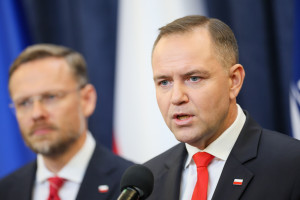One in ten vaccinations is administered in a pharmacy. With the change in regulations, this number could increase significantly.

From the beginning of 2024 to August 20, 2025, 5.9 million vaccination cards were issued, of which 533.4 thousand in pharmacies ( 9% ) - according to data from the e-Health Center obtained by the editorial office of Rynek Zdrowia.
Of the 533,400 vaccination cards identified , 29,000 had a corresponding pharmaceutical prescription recorded, representing 5.4% of cases. This does not necessarily mean that in the remaining cases, the vaccine was administered at the physician's request – especially since in 532,700 cases, the person qualifying and administering the vaccination was a pharmacist.
The e-Health Center explains that vaccination records do not include information about the entity referring the patient for vaccination—only the person who qualified and performed the procedure. It's also unclear exactly how many vaccinations were administered to pharmacists and their families (because pro auctore and pro familiae prescriptions are not assigned to a pharmacy).
With the above in mind, we have been informed that since the beginning of 2024, 4.3 million vaccine prescriptions have been filled, of which 43.7 thousand were based on pharmaceutical prescriptions .
Pharmacies' involvement in the vaccination process for Poles may increase significantly over time. This is because, as of Monday ( August 25th ), regulations came into effect, according to which adults (over 18 years of age ) can take advantage of a wide range of free vaccinations at pharmacies.
Vaccination against:
- COVID-19,
- flu (in the autumn-winter season),
- respiratory syncytial virus (RSV) infections,
- pneumococci,
- shingles,
- human papillomavirus (HPV),
- tick-borne encephalitis,
- hepatitis A or B,
- diphtheria, tetanus and pertussis (DTaP),
- measles, mumps and rubella (MMR),
- acute polio,
The change results from the announcement of the Minister of Health regarding the list of preventive vaccinations carried out in pharmacies, which may be fully or partially financed from public funds.
Importantly, vaccination is formally subject to reimbursement , which means that some patients (groups not indicated in the announcement) will have to pay for the preparations.
COVID-19 vaccinations will actually be available when their supply arrives - the Ministry of Health informed that the resumption of administration of preparations is planned for the end of September this year.
Doctors and pharmacists argue over patient safetySpecifically, this was due to the position of the Supreme Medical Council, which indicated that vaccinations should be administered exclusively in healthcare facilities. It argued that such entities were the only ones that guaranteed adequate preparation in terms of facilities and equipment, which not only improved patient safety but also guaranteed the privacy of the services provided and the protection and confidentiality of data. In the context of the proposed announcement, this statement could be interpreted as suggesting that a pharmacy is not a healthcare facility, a position that is not supported by the regulations.
It was also noted that the qualifying pharmacist does not have access to the medical records of the person being vaccinated, which creates a real risk of post-vaccination complications. This is particularly important for patients with conditions such as diabetes, cancer, autoimmune diseases, and HIV/AIDS.
"In the above-mentioned cases, it should be recognized that the decision to vaccinate a patient should still rest with a physician who has full knowledge of the patient's health condition and ongoing therapies. Taking into account the above considerations, the Presidium of the Supreme Medical Council recommends reviewing existing guidelines and organizational requirements for pharmacies," the statement stated.
It was also noted that there is an urgent need to promote educational activities regarding the provision of full medical documentation by patients before vaccination.
Marek Tomków , president of the Supreme Pharmaceutical Council, told us at the time that pharmacies are formally healthcare facilities. He pointed out that limiting vaccinations to facilities where doctors see patients would mean that vaccinations could not be administered in social welfare homes or schools (HPV vaccinations).
He reminded the public that pharmacists can obtain permission to view prescription history within the Online Patient Account , similar to primary care physicians who see patients who aren't their own. They use this option, if only to ensure that the person hasn't been previously vaccinated.
"We cannot agree with the statement that, for example, a diabetic patient will experience more complications if they get vaccinated at a pharmacy. The latest guidelines state that these people must be prioritized for vaccination, and the requirement for them to see a doctor has been abolished," said Marek Tomków.
However, Jakub Kosikowski, spokesman for the Supreme Medical Chamber, admitted that there had been a misunderstanding.
"We were only interested in cases of patients with multiple morbidities, oncology, transplant recipients, or HIV/AIDS. We didn't want to attack HPV vaccinations in schools or flu and COVID-19 vaccinations in pharmacies," he explained.
Marek Tomków countered that pharmacists refer patients with more complex medical histories to their physicians and choose not to vaccinate them. An exception may be made when such patients come to the pharmacy with a referral for vaccination from their treating physician.
Both commenters acknowledged that discussions took place at the level of the presidiums of both local governments, and the issue of the NRL presidium's unfortunate position was resolved. However, this does not change the fact that the content of the opinion remains unchanged and may still undermine trust in pharmacists.
Write to the author: [email protected]
Copyrighted material - reprint rules are specified in the regulations .
rynekzdrowia











